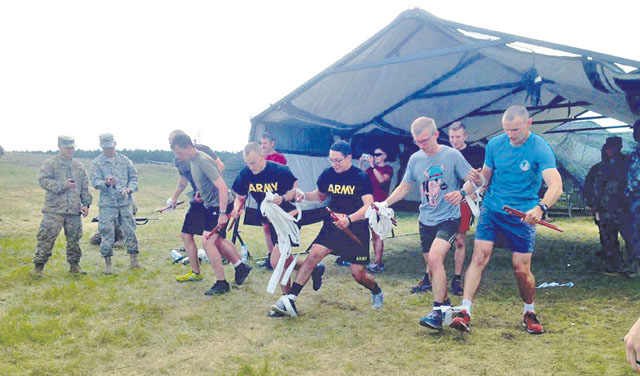
Soldiers from 421st Medical Battalion (Multifunctional); Polish 1st Army Field Hospital, 10th Military Hospital; and the U.K.’s 16th Medical Regiment team up for the three-legged relay race during the “Torun Games” June 8 in Torun, Poland.
TORUN, Poland — Taking a break from river crossings, airborne operations and other intense training events at exercises Anakonda ’16 and Swift Response ’16, the 421st Medical Battalion (Multifunctional) hosted a friendly sports competition between U.S., Polish and U.K. forces June 8.
The “Torun Games” included a three-legged race using white engineer tape, a water-jug relay race, a sandbag relay race and a baton relay race as the final event.
Sgt. William Hilton, organizer of this event from the 421st MMB, knew that physical fitness is important to other military nations and used it as a way to bring the Polish 1st Army Field Hospital, 10th Military Hospital; and the U.K.’s 16th Medical Regiment together.
“I realized that we had a perfect opportunity to share our knowledge and culture by hosting a team sports event with our allies,” Hilton said. “I am glad to be a part of exercise Swift Response ’16 (and) Anakonda ’16 and to have made new friends with our partners through working together and through this event.”
The Polish 1st Army Field Hospital took first place with the 421st MMB coming in second and the U.K.’s 16th Medical Regiment trailing in third. Informal social and leisure events like this one are becoming more common in multinational exercises, as Soldiers and leaders learn that these events help build relationships which in turn improves the partner nations’ ability to work together effectively.
The three units were working together to provide medical support to a variety of Anakonda ’16 training events, including a multinational airborne operation and a mass casualty exercise.


